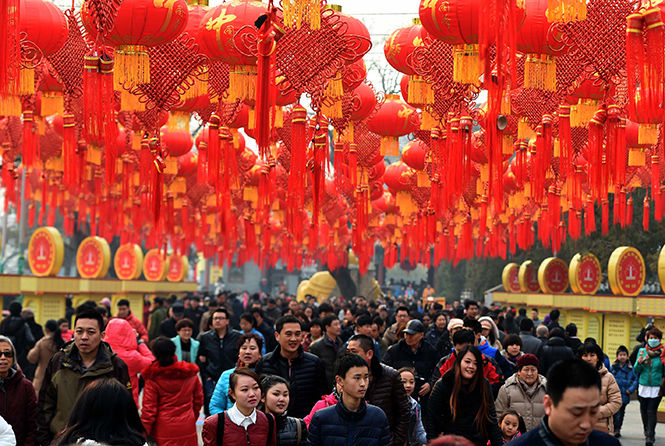KSU international students share importance behind the Chinese New Year
Visitors walk past a passage of red lanterns during the annual temple fair at Badachu Park in Beijing on Thursday, Feb. 19, 2015. The temple fair kicked off on Thursday, the first day of the Chinese Lunar New Year. (Li Jundong/Xinhua/Zuma Press/TNS)
February 23, 2015
For international students from China, being away from home may be difficult as the Chinese New Year started Feb. 19.
International Admissions Counselor Le Kang said the Chinese New Year, also known as the Spring Festival, is the most important festival in China.
“It is a time for families to reunite,” Kang said. “Families will spend a couple of days together just for the celebration.”
Families spend the time together watching the “New Year’s Gala,” a Chinese New Year special live on television and cooking dumplings – a traditional dish, Kang said.
The Chinese use two different types of calendars – solar and lunar. The lunar calendar is based around the Kanges of the moon and consists of 12 different animals.
This year there has been much debate, however, regarding the animal. Kang said in China, they call the animal a “yang” which represents the sheep, yet it is shaped like a goat.
“But to us, it doesn’t really matter,” Kang said about the disagreement.
Graduate fine arts major Zhangyahui Liu said this year is symbolic for her because she was born during another year of the sheep.
“This year could be extremely lucky or dangerous for me,” Liu said. “I will be wearing lots of red and gold to protect me during the new year.”
Liu said she has received more than 300 messages so far from her family and friends wishing her a happy new year. She stressed the importance of wishing people a happy new year, much like how Americans do here.
Festivities typically last for more than two weeks where families will participate in traditional customs, she said. Those customs can include putting up a scroll on their front door to protect the family during this time.
Older generations will send younger generations money for the new year in a red envelope, Liu said. The envelope is red because of its importance in the duration of the festival.
Sung-Chun Chou, a graduate teaching English as a second language major, said it’s important for the festival to be spent with family.
“In China there are a lot of people that leave their hometown to go to bigger cities or other countries for work,” Chou said. “New Years Day, people can go back to their homes and be with their families.”
Chinese international students often get together to celebrate with friends – Chinese or American – to celebrate, since they cannot celebrate in China with their families, Chou said.
Technology has made not celebrating at home easier, Chou said, and that he is thankful to still be able to speak to family while the celebration is going on.
“Some of my friends have been here (in the United States) for four to five years and haven’t gone home for the Spring Festival,” Liu said.
Being in the United States for the festival is a different experience because international students can’t partake in traditions to prepare for the festival with family one would would do at home, Liu said.
Contact Taylor Meade at [email protected].

























